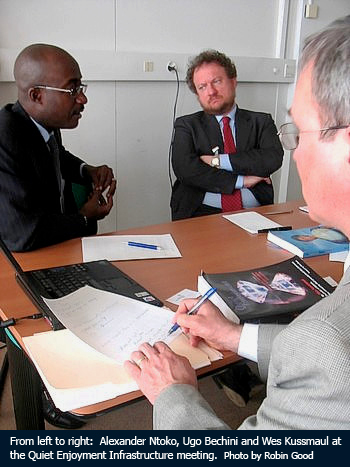About Individual Membership Section of The Authenticity Alliance
 World e-Trust and Beyond The Telecommunication Development Unit of the International Telecommunication Union (ITU), also
known as ITU-D, launched the World e-Trust Initiative in 2002 to help developing nations accelerate the pace of economic development through the effective use of information and communication technology (ICT). Individuals
from developed nations soon realized the public key infrastructure at the heart of World e-Trust could be the basic construction material for building authenticity & privacy for the developed world as well.
World e-Trust and Beyond The Telecommunication Development Unit of the International Telecommunication Union (ITU), also
known as ITU-D, launched the World e-Trust Initiative in 2002 to help developing nations accelerate the pace of economic development through the effective use of information and communication technology (ICT). Individuals
from developed nations soon realized the public key infrastructure at the heart of World e-Trust could be the basic construction material for building authenticity & privacy for the developed world as well.
The Two Sides of Individual Membership Section of The Authenticity Alliance Wes Kussmaul, a member of the ITU Global Cybersecurity Agenda High Level Experts Group (HLEG) saw the need for an association to represent the needs of individuals, and formed Individual Membership Section of The Authenticity Alliance to bring the concerns of individuals together with those of nations & organizations. The goal of the Individual Membership Section of The Authenticity Alliance is to build domains of authenticity, privacy and reliability on top of the open, outdoor public highway known as the Internet.
QEI Building on World e-Trust, Wes developed the basis for a new identity information infrastructure.
 Called the Quiet Enjoyment Infrastructure, or QEI, this infrastructure borrows
from real estate to create an etymology and foundational understanding for the building of our future online spaces.
Called the Quiet Enjoyment Infrastructure, or QEI, this infrastructure borrows
from real estate to create an etymology and foundational understanding for the building of our future online spaces.
In QEI, the technical term for domains of authenticity is "buildings."
QEI takes the PKI construction materials at the heart of World e-Trust and lays out an architecture, building codes, methods of engineering and construction, as well as the means for professional licensing of architects, engineers, contractors and building inspectors. In a QEI environment, "Indoor" code is written by a professionally licensed contractor and digitally signed by a professionally licensed building inspector.
Who issues these professional licenses? Who takes responsibility for the building inspections, that is, the code inspections? Who certifies?
For centuries, all reliable certification has been based upon duly constituted public authority. In the online world, where anyone can purport to be anyone, that basis of reliable certification is crucial. In World e-Trust/QEI, duly constituted public authority performs certification. The Individual Membership Section of The Authenticity Alliance commits to bring the benefits of reliable certification to the online world.
Osmio At the QEI meeting at ITU headquarters (Geneva) March 7, 2005, a new online-only municipality, Osmio (the AuthentiCity) was conceived and introduced. Osmio's Buildings Department will issue occupancy permits - digital certificates - to Indoor spaces that meet all building codes. These Indoor spaces will be constructed with code signed by professionals who hold licenses - digital certificates - issued by the professional licensing department.
We feel that individuals should have an opportunity to support the goals of this important initiative. Please look closely and consider signing our Memorandum of Support (MoS). The MoS will be presented to the leadership of the ITU. Read on
